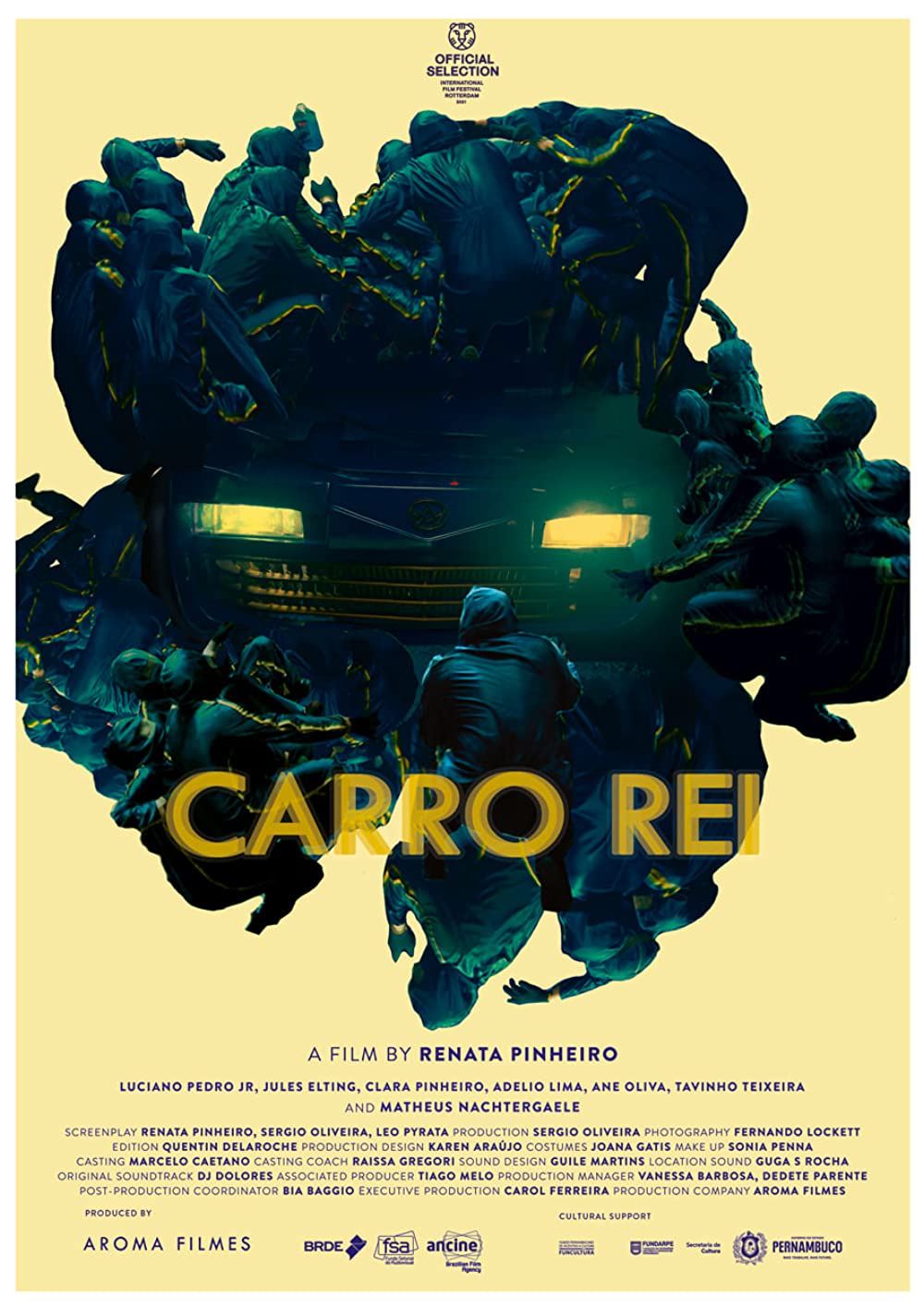
I’m no stranger to films about sentient cars. I probably watched The Love Bug no fewer than 563 times as a kid and my grandfather always had on reruns of Knight Rider when I would go visit. So the idea of a car that has a mind of its own wasn’t foreign to me, but it was disappointing when my first car didn’t actually talk. In Renata Pinheiro’s new film King Car, she uses the idea of sentient vehicles in order to delve into the very complicated issues of the global climate crisis and how it affects underprivileged populations. For those who might dismiss the film because they don’t like politics mixed into their movies, I will remind you that King Car is a full on sci-fi film. Science fiction has always been a vessel for social commentary from Gene Roddenberry’s Star Trek to Robert Heinlein’s Starship Troopers. King Car is no different in that respect and it is a pretty crazy ride at that, so strap in and let’s talk about some talking cars.

Ninho was born in the backseat of one of his father’s taxis, and as a child, he loved to play there. His father was the proud proprietor of his own taxi company and it was expected that one-day Ninho would carry on his legacy. He probably didn’t think anything of it at the time, but when Ninho would play in his father’s taxi the car would actually talk to him. Kids have imaginary friends all of the time, so talking to a car isn’t really the worst thing a child could do. One day after an argument with his father, Ninho’s mother storms off in the taxi and while distracted is driving straight for Ninho, who is playing soccer in the street. The taxi yells at Ninho to get out of the way and saves his life, but his mother crashes the car and dies. From then on, that taxi remains in the junkyard as just another broken-down vehicle.
Flash forward to a teenage Ninho (Luciano Pedro Jr.) who is on the precipice of adulthood and is approached by his father about taking over the family business and continuing on that legacy. Owning a taxi company isn’t something that Ninho is interested in and he ends up getting into a fight with his father. This leads him to leave home and go live in a community of young environmentalists. It turns out that Ninho is dedicated to a more sustainable way of life and his passions lie in finding ways to grow better crops and trying to combat the climate crisis. To be fair, there are far worse things that a kid could be getting into in a city with little opportunity.
Thus far the film seemed pretty straightforward with the message that it was sending, but then Pinheiro threw me a curveball that really made me examine some of my own thoughts on the automobile industry. One evening, Ninho’s father is driving a fare to an interview with a local politician. Ninho’s father is proudly telling his rider that he was finally able to purchase all of the cars in his fleet, but the rider makes light of this feat by telling him that he didn’t even have facial hair when that car was made. The interview with the politician is announcing a new law that would effectively ban any car that was 15 years or older from the roadways. Ninho’s father’s whole life is wrapped up in a taxi business where the newest car may be in good condition but is well over 15 years old and this new law would essentially kill his livelihood.
I’m not really a big gear head and to me, a car is something to get from point A to point B. I would prefer it to get really good gas mileage so I can save money. For that reason, I really like cars that are fuel efficient and I am a big supporter of all cars being built in that fashion. What King Car really hit me with was “what about the people who can’t afford those cars?” I know that this makes me sound like a privileged individual that the thought of others not having the financial means to change their lifestyle to combat the climate crisis didn’t occur to me. I think that I am part of the audience that Pinheiro is trying to reach here. Ninho’s father is just trying to make a living and provide for his family, and his taxi business is the way he has been able to do that, as there aren’t a lot of other options for him, especially as an older member of society. The film never portrays Ninho’s father as a climate denier or someone who doesn’t care about the environment, but this law to help fight the crisis is going to crush him. Pinheiro is reminding those that are more fortunate that this is a struggle that is complicated and without opportunity and wealth for those that are not able to invest in zero-emission vehicles, many people will be thrown into financial hardship from such new laws.

The news of the law is so stressful on Ninho’s father that he ends up suffering a heart attack and has to be hospitalized. In a moment of distress, Ninho returns to his father’s home and sits in the old wrecked taxi that has been covered since he was a child, only to find that the car still talks to him and maybe it wasn’t his imagination all along. When Ninho tells his incredibly strange uncle, Ze Macaco (Matheus Nachtergaele), about the talking car, his uncle believes him and begins helping fix up the car. Ze Macaco has been in Ninho’s life since he was a child and always repaired his father’s taxis for him. While he was definitely quirky, he always supported Ninho. After getting the car running, they decide to give it an overhaul to try to bypass the new law and skate around the car’s age, and in the process, Ze Macaco develops a way to get titular King Car to speak, full on Knight Rider style.
King Car starts to go in a different direction at this point in the film and it somewhat clouds the overall message for me, but it definitely makes the film stand out. After their success with King Car, Ze Macaco and a team of mechanics that he puts together start to fix up other old cars so that they can circumnavigate the vehicle age law. They start, in a sense, a car cult that advocates for the vehicles the same way Ninho advocates for the planet. At this point though, Ninho is starting to see that everything is getting out of hand and that the cars are plotting to kill his activist friends. If this is all starting to sound incredibly weird, don’t worry because it is incredibly weird. King Car takes bizarre scenarios and really turns up the allegories in order to get its point across, but you really just have to be willing to go along with the narrative. Some of the bigger picture gets a bit lost in all the craziness. I think that overall Pinheiro succeeded in her message that fighting the climate crisis is not as easy and clear-cut as everyone makes it out to be, but that doesn’t mean it isn’t worth all of the effort.
King Car is a wild film with tons of ambition and a big message. For the most part, it really worked for me. I had a blast watching the insanity unfold and it really made me stop and reevaluate some ideas that I thought were pretty straightforward, so I consider the film a smashing success.

King Car was screened as part of Nightstream 2021.

More Festival Coverage
Bringing you more found footage and POV horror than you can shake a stick at, Unnamed Footage Festival is back at it once again with an incredible lineup for 2023…. Self-described as a metalhead for life, Chilean filmmaker Patricio Valladares makes some noise in this year’s version of Unnamed Footage Festival. Taking place in San Francisco, this event is proud… Have you ever had a heart-to-heart with a bartender? I’ve often heard peers joke about how bartenders are basically therapists with a license to sell alcohol, and although I haven’t… The Rage Part II is a 2023 British zombie horror, written and directed by Joshua Cleave. After studying film and television production at Leeds Metropolitan University, Joshua went on to… Euro-surrealism at its most mind-assailing, as Dave has inherited his father’s run-down and weird Hotel Poseidon. A dilapidated hellscape where logic is frequently suspended attracts the weirdest of the weird,… Covering all things scatological, Unco Film Festival is back with its twelfth installment of excreta exploration. Hosted by legendary mangaka Shintaro Kago, the festival displays the work of independent filmmakers…Unnamed Footage Festival 666 (2023) Short Films Collection- A Short, Sharp Shock to the System
Invoking Yell (2023) Film Review- Not with a Bang but with a Shriek (Unnamed Footage Festival 666)
Reunion (2021) Film Review – A Cyberpunk Arthouse Drama in the Age of Loneliness
The Rage Part II (2023) Film Review – All The Rage (Unnamed Footage Festival 666)
Hotel Poseidon (2021) Film Review – A Day in a Life, in a World Where Nothing Makes Sense
Unco Film Festival Vol 12 – Extreme Excreta Exploration





